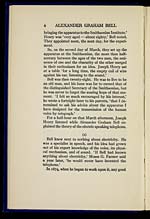Alexander Graham Bell (1847-1922)
Alexander Graham Bell : the man who contracted space
6
ALEXANDER GRAHAM BELL
bringing the apparatus to the Smithsonian Institute.’
Henry was ‘very aged —about eighty,’ Bell noted.
They appointed noon, the next day, for the experi-
ment.
So, on the second day of March, they set up the
apparatus at the Smithsonian, the more than half-
century between the ages of the two men, the emi-
nence of one and the obscurity of the other merged
in their enthusiasm for an idea. Joseph Henry sat
at a table ‘for a long time, the empty coil of wire
against his ear, listening to the sound.’
Bell was then twenty-eight. He was to live to be
an old man, and his fame was far to exceed that of
the distinguished Secretary of the Smithsonian, but
he was never to forget the soaring hope of that mo-
ment. ‘I felt so much encouraged by his interest,’
he wrote a fortnight later to his parents, ‘that I de-
termined to ask his advice about the apparatus I
have designed for the transmission of the human
voice by telegraph.’
For a half-hour on that March afternoon, Joseph
Henry listened while Alexander Graham Bell ex-
plained the theory of the electric speaking telephone.
(2)
Bell knew next to nothing about electricity. He
was a specialist in speech, and his idea had grown
out of his expert knowledge of the voice, its physi-
cal mechanism, and of sound. ‘If Bell had known
anything about electricity,’ Moses G. Farmer said
a year later, ‘he would never have invented the
telephone.’
In 1874, when he began to work upon it, any good


